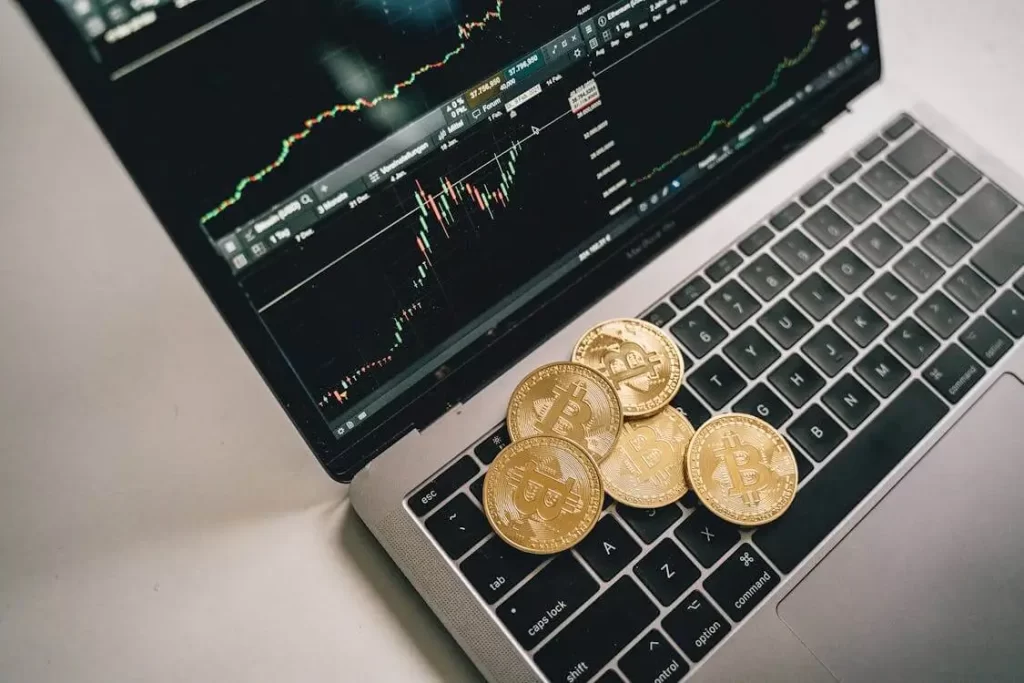
Since its inception in 2009, Bitcoin has emerged as a disruptive force, challenging traditional notions of currency and investment. The global digital asset’s meteoric rise in value has sparked both curiosity and apprehension, leading many to ponder its potential as a lucrative investment opportunity.
However, like any investment, Bitcoin comes with its own set of potential risks. Keep reading as digital asset management consultants at Kenson Investments share some bitcoin investment strategies to help you mitigate risks and position yourself for success in the dynamic world of crypto investments.
Content
Bitcoin: The Basics
Bitcoin, often referred to as a cryptocurrency, is a decentralized digital currency that operates on a peer-to-peer network known as the blockchain. Unlike traditional fiat currencies, such as the US dollar or the euro, Bitcoin is not issued or regulated by any central authority like a government or financial institution. Instead, it relies on cryptographic principles to secure transactions and maintain its integrity.
The Potential of Bitcoin Investment
Hedge against inflation
Unlike fiat currencies, which can be subject to government manipulation and devaluation through excessive money printing, Bitcoin’s supply is capped at 21 million coins. This scarcity has the potential to preserve purchasing power over time, making Bitcoin an attractive store of value in inflationary environments.
Portfolio Diversification
Bitcoin’s low correlation with traditional asset classes, such as stocks, bonds, and real estate, makes it an effective diversification tool for investment portfolios. Adding Bitcoin to a diversified portfolio can help reduce overall portfolio risk and enhance risk-adjusted returns by introducing an uncorrelated asset with the potential for high returns.
Global Accessibility
Bitcoin’s borderless nature and decentralized infrastructure enable anyone with an internet connection to buy, sell, and hold Bitcoin, regardless of geographical location or socioeconomic status. This accessibility democratizes access to financial services and investment opportunities, particularly for individuals in regions with limited access to traditional banking services.
Potential for Growth
Bitcoin’s decentralized and disruptive nature positions it at the forefront of a paradigm shift in global finance. As the adoption and acceptance of Bitcoin continue to grow among individuals, institutions, and governments worldwide, its value proposition as a digital gold and alternative financial system becomes increasingly compelling. Consequently, Bitcoin has the potential to deliver significant long-term capital appreciation for investors.
Emerging Institutional Adoption
Institutional adoption of Bitcoin is on the rise, with prominent companies, hedge funds, asset managers, and even central banks allocating capital to Bitcoin as part of their investment strategies. This institutional influx not only validates Bitcoin’s legitimacy as an asset class but also enhances liquidity, market efficiency, and mainstream acceptance, further bolstering its long-term potential.
Technological Innovation
Beyond its role as a digital currency, Bitcoin’s underlying blockchain technology has the potential to revolutionize various industries, including finance, supply chain management, healthcare, and voting systems. As developers continue to innovate and build upon Bitcoin’s open-source protocol, new applications, use cases, and value propositions may emerge, driving further adoption and investment.
Financial Sovereignty and Freedom
Bitcoin empowers individuals with financial sovereignty and freedom by providing a censorship-resistant, permissionless, and peer-to-peer alternative to traditional financial systems. With Bitcoin, individuals can transact and store value without reliance on intermediaries or third parties, reducing counterparty risk and increasing financial autonomy.
Risks Associated with Bitcoin Investment

Volatility
Bitcoin is notorious for its price volatility, with prices capable of experiencing rapid and substantial fluctuations within short periods. This volatility can result in significant gains for investors but also poses a risk of substantial losses, particularly for those with a short-term investment horizon or high leverage.
Regulatory Uncertainty
The regulatory landscape surrounding Bitcoin and cryptocurrencies remains uncertain and subject to change, with different jurisdictions adopting varying approaches to regulation. Changes in regulations, government crackdowns, or adverse regulatory actions could impact the adoption, usage, and value of Bitcoin, leading to increased uncertainty and market volatility.
Security Risks
Bitcoin investments are susceptible to security risks, including hacking, theft, and fraud. While Bitcoin transactions are secured by cryptographic principles and recorded on a decentralized ledger known as the blockchain, individual investors are responsible for securing their Bitcoin holdings through appropriate measures such as using reputable cryptocurrency exchanges, implementing robust security protocols, and utilizing hardware wallets or cold storage solutions.
Market Manipulation
The relatively small size and liquidity of the Bitcoin market compared to traditional financial markets make it susceptible to market manipulation and price manipulation tactics, such as pump-and-dump schemes, spoofing, and wash trading. These manipulative practices can distort market prices, mislead investors, and create artificial volatility, posing risks to retail and institutional investors.
Liquidity Risks
While Bitcoin has gained mainstream acceptance and liquidity over the years, it still lacks the depth and liquidity of traditional asset classes like stocks and bonds. This lack of liquidity can exacerbate price volatility and make it challenging to execute large trades without significantly impacting the market, particularly during periods of heightened volatility or market stress.
Technology Risks
Bitcoin’s underlying technology, including its blockchain protocol, consensus mechanisms, and network infrastructure, is subject to technological risks and vulnerabilities. These risks include software bugs, coding errors, protocol upgrades, and network attacks, which could compromise the security, stability, and integrity of the Bitcoin network and ecosystem.
Competition and Innovation Risks
While Bitcoin was the first cryptocurrency and remains the largest by market capitalization, it faces competition from other cryptocurrencies, blockchain platforms, and digital assets seeking to address scalability, speed, privacy, and governance issues. Emerging technologies, innovations, and competitive pressures could impact Bitcoin’s market share, adoption, and long-term viability as an investment.
Bitcoin InvestmentStrategies

Education and Research: The first step in mastering Bitcoin investment is to educate yourself about the technology, market dynamics, and potential risks and rewards. Take the time to read whitepapers, research articles, and reputable sources to gain a deeper understanding of Bitcoin and its underlying principles.
Dollar-Cost Averaging (DCA): Dollar-cost averaging is a time-tested investment strategy that involves investing a fixed amount of money into Bitcoin at regular intervals, regardless of price fluctuations. This approach helps smooth out volatility and can be particularly effective for long-term investors looking to accumulate Bitcoin over time.
Long-Term Perspective: While Bitcoin’s price can be highly volatile in the short term, taking a long-term perspective can help investors weather market fluctuations and capture the potential upside of Bitcoin’s growth trajectory. Focus on the underlying fundamentals of Bitcoin and its potential to disrupt traditional financial systems over the long term.
Risk Management: As with any investment, risk management is essential when it comes to Bitcoin. Only invest what you can afford to lose, and consider diversifying your investment portfolio to mitigate risk. Additionally, consider implementing stop-loss orders or setting price targets to protect your investment from significant losses.
Secure Storage: Given the decentralized and immutable nature of Bitcoin, securing your investment is paramount. Utilize hardware wallets, cold storage solutions, or reputable cryptocurrency exchanges with robust security measures to safeguard your Bitcoin holdings from potential theft or hacking.
Stay Informed: The cryptocurrency market is fast-paced and ever-changing, with new developments, regulatory updates, and technological advancements occurring regularly. Stay informed by following reputable cryptocurrency news sources, participating in online communities, and engaging with fellow investors to stay ahead of the curve.
Digital asset management consultants at Kenson Investments can help you navigate the world of investments in the digital age. They understand all the fundamentals of Bitcoin investments and stay updated with the rapidly evolving landscape to help you capitalize on the opportunities presented by this transformative digital asset.
Call 1.800.970.2506 for tailored Bitcoin investment strategies.
Disclaimer: The content provided on this blog is for informational purposes only and should not be construed as financial advice. The information presented herein is based on personal opinions and experiences, and it may not be suitable for your individual financial situation. We strongly recommend consulting with a qualified financial advisor or professional before making any financial decisions. Any actions you take based on the information from this blog are at your own risk.
About the Author
Paul Smith is a seasoned financial analyst and cryptocurrency enthusiast with a passion for educating investors about the opportunities and risks associated with Bitcoin investment. With over a decade of experience in the finance industry, Paul has worked with a diverse range of clients, from individual investors to institutional asset managers, providing insights and guidance on portfolio management, risk mitigation, and investment strategies. When he’s not analyzing markets or writing about Bitcoin, John enjoys exploring the great outdoors, playing guitar, and spending time with his family.

Martin Wilson has been following the crypto space since 2013. He is a passionate advocate for blockchain technology, and believes that it will have a profound impact on how people live their lives. In addition to being an avid blogger, Martin also enjoys writing about developments in the industry as well as providing useful guides to help those who are new to this exciting frontier of finance and technology.
